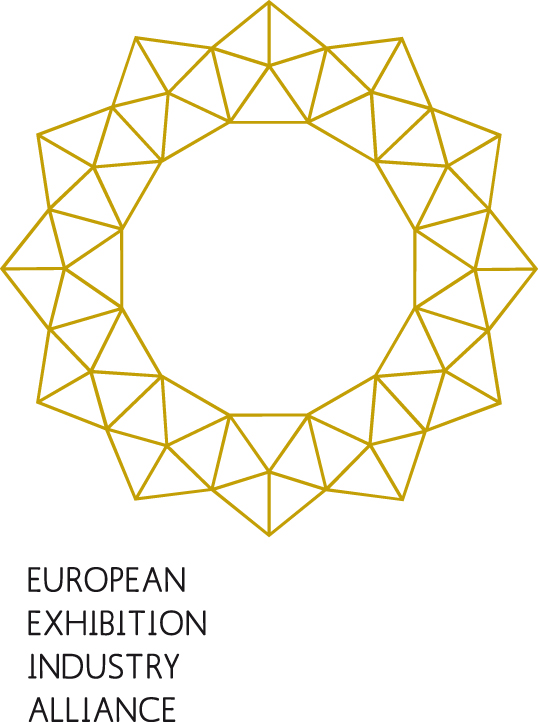- EU Institutions cooperate and approve measures swiftly to save companies across Europe
- EU Institutions open for proposals for measures to help exhibition industry effectively
- EEIA to collect and deliver measures with immediate effect and for medium term recovery support from all countries to EU and national governments
Due to the covid-19 restrictions, the planned physical Exhibition Industry EU Dialogue in Brussels for this day had to be postponed. Instead, a web conference was organized. Over 100 members of the industry participated in this one-hour meeting. The web conference was kindly hosted by IELA.
Barbara Weizsäcker, Secretary General of EEIA and EMECA, and Nick Dugdale- Moore, Regional Manager Europe at UFI, welcomed the participants at this very crucial moment for our industry as nearly all exhibition activity has closed down and many companies in our sector as well as the industries we serve struggle to survive. All disciplines of our sector were represented: venues, organisers, service providers, logistics, plus national associations – overall 101 participants from 16 countries.
The following speakers from the EU Institutions were present to share their news:
Eric Philippart, Senior Expert, European Commission, DG Grow
Attila Benedek in place of Istvan Uhjeyi, MEP, Vice Chairman of the Committee on Transport and Tourism (S&D Group)
Ana Štrbac, Croatia’s Permanent Representation to the European Union
Kai Hattendorf, CEO of UFI, gave a quick overview on the global situation, especially on Asia and also stressed the vital role and systemic relevance exhibitions play for a recovery phase to all industries.
Barbara Weizsäcker provided figures for the impact on the European exhibition industry in good times, presented damage caused by postponements and cancellations of events so far, gave voice to the main asks of the industry to the EU and national governments and provided an overview of the measures approved last Friday by the European Commission (in the annex).
Eric Philippart, Senior Expert at European Commissions DG Grow described the general and specific measures and action taken at the Commission level, showing that the Commission moved quickly and on several levels to ease the impact of the coronavirus. General measures such as state aid flexibility, support for liquidity for companies by providing guarantees and more specific measures such as the problem of empty flights to not lose airport slots had been taken by the Commission in record time. Visa Centres are already back open in China to process requests so that business can restart when the restrictions will be loosened in Europe. Some legislative measures are also on the way to keep highly skilled employees on board. In the medium-term, measures to allow people to travel again and make it even easier are also being worked on, such as Visa facilitation with China. In co-financed action together with the Member States, destination marketing could focus specifically on exhibitions in the recovery phase. B2B matchmaking supported and organised by EU funded programmes shall help to fuel business once the recovery starts. Eric Philippart welcomes examples for useful measures or programmes from our industry from any country. UFI and EMECA will collect proposals and measures and establish a list per country. It will be provided to all Members and the EU Institutions and can also be used for national lobbying providing examples from other countries.
Attila Benedek reported that the European Parliament was closed during this week while the EP’s approval is needed for a number of important decisions. He stressed the double role of the European Parliamentarians who are connected to the local/national level as well as the European level and usually are very well informed on the developments on the ground, better than the other two institutions. Therefore, MEPs offer support not only in this emergency situation. He underlined that in the last two weeks the three European Institutions including the Member States worked very well together and managed to approve many measures and packages as everyone was aware that time is a critical factor to get support to the companies. Now, contact to governments and national institutions is key. The aim is to use this experience to create a crisis-proof system to be ready and more professional in such a critical situation in the future. He also stressed that exchanging measures and ideas was vital so that every company can get what suits best. Additionally, he mentioned the European Investment Bank’s package supporting national banks for loans to companies.
Ana Štrbac explained that also the European Council works under special conditions with many video conferences instead of regular physical meetings and that several meetings with ministers are still planned for this week. Financial Ministers and Ministers for Economy are coordinating both on EU and on national level. The Council had sent out a questionnaire to all Member States about the most affected sectors and best measures to be taken in this situation. Based on the analysis of this the respective ministers will be deliberating. As the situation changes on a daily basis, facilitating dialogue and exchanging information is one of the main roles of the Presidency of Croatia of the Council of the European Union.
Loredana Sarti from AEFI spoke for the most affected countries in Europe so far, Italy. She called on not blocking goods transports, to act about the spread which squeezes Italy’s finances and called for more funds to ease the damages caused in the exhibition sector.
All three speakers from the different EU Institutions made it clear that they are open and thankful for proposals coming directly from by the exhibition industry as they are aware of how heavily the exhibition industry has been affected. EEIA will keep delivering them input on impact of the damages and measures to adopt. All Members are invited to increase lobbying on national level to access funds and to inspire tailor made measures and their speedy implementation.







Leave A Comment